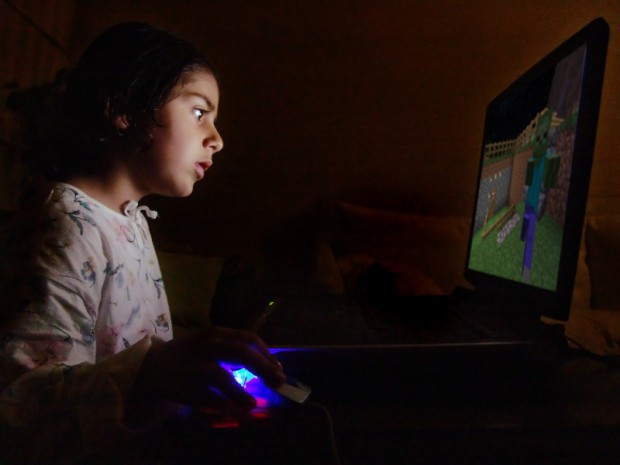
Kids and video games is an often talked about subject in today’s world. My teenage son’s gaming habits are growing just as the industry is becoming more appealing than ever before. On the flipside, I also have a young daughter, being brought up in a world where technology is growing faster than the human race developing it. With so many games and devices to play them on today, I’ve been asked if and how I limit my kids’ playtime, or more specifically their overall ‘screen time’.
I was both surprised and amazed by such questions. Some parents seem to think that if their child spends long periods of time doing just the one activity, then something maybe wrong, as they would not behave that way themselves as an adult. I’m a firm believer that children need to be able to make good choices on how they spend their free time, and that choices are they for them to do just that.
Kids shouldn’t be brought up on ‘do this, don’t do that’ rules, except for those instances where they are instructed to complete a share of chores, or that they must not do things that will hurt themselves or others. Kids should be free to play and explore in the many possible ways they can, and if that results in them only doing so in only the one way, then that just means they are getting something out of it, and are comfortable with it. The last thing we should do is put up a barrier that says: “I don’t think you can control your own life” before they have even had the chance to.
Kids also need to learn to know what is best for them; after all, we are all different with different tastes. Why would anyone want to limit our children’s computer or video game time? Today’s computer technology provides the most important tools in modern society, and children today are born into this culture. This is only good for our children, who are born designed to take in what is around them, in order to decide what is best for them, or what they need to succeed. It’s instinctive.
 Certain media outlets are among that side against video games through fear; they cause depression, attention disorders, even obesity, and more. This has been happening since video games first entered our world and isn’t letting up. But the very same negativity was branded upon mediums that came before: television, music, reading and even writing.
Certain media outlets are among that side against video games through fear; they cause depression, attention disorders, even obesity, and more. This has been happening since video games first entered our world and isn’t letting up. But the very same negativity was branded upon mediums that came before: television, music, reading and even writing.
Now I’ve never known a parent admonish their child for spending hours reading a book, and why would they? Furthermore, if you look at research literature and surveys, they not only debunk those very claims, but in fact show that regular games players are less likely to be obese, enjoy outdoor play more, and are more socially engaged and well-adjusted.
Then there is the matter of violent content. I find it hard to believe that pretend murder of characters in video game stories should be likely to provoke real murder; certainly no more than reading Shakespeare’s Hamlet for example, a piece of literature often placed as compulsory for students in our schools. It is my view that video games actually reduce hostility – for me there is nothing better than to forget a stressful day at work by unwinding with a game of FIFA, or maybe something combat oriented which serves as my punch bag of frustration.
 My daughter, an avid Thomas & Friends fan, spends some of her time on iPad activity apps, such as Thomas, which have certainly helped her develop speech, recognise colours, and she can easily count to 50, all at the age of 3. I see her playing out her own Thomas adventures with her engines, which comes naturally, but has also been benefitted from YouTubers’ own uploaded adventures, expanding her imagination to the point of playing out her own adventures.
My daughter, an avid Thomas & Friends fan, spends some of her time on iPad activity apps, such as Thomas, which have certainly helped her develop speech, recognise colours, and she can easily count to 50, all at the age of 3. I see her playing out her own Thomas adventures with her engines, which comes naturally, but has also been benefitted from YouTubers’ own uploaded adventures, expanding her imagination to the point of playing out her own adventures.
I’m not saying screen time is solely responsible for this by any means, but she often wants to pursue more of these activities, of which today’s technology can provide. It goes without saying of course that any such use and behaviours are supervised; that’s when parenting comes in, as and when required.
For my teenage son, he has a steady social balance; multiplayer Minecraft team sessions that benefit from group chat, with the very same friends he will then socialise with at his football team training sessions and other gatherings in between. He isn’t a huge gamer (unlike me) but I believe his participation only to be positive as he moves forward into adulthood.
So should anyone ever ask if I (or should I) restrict my children’s screen time, my answer would be NO. They make their own minds up whether to use the technology that is there, I don’t encourage or discourage either way. I believe they are both better prepared for the world’s social pressures, and only benefits their development, just like any other medium can.
How about you? What are you views on this, do you feel the same? Do you do things differently for your children? Or the parents to-be amongst you, will your approach be the same?
Kids and video games is an often talked about subject in today’s world. My teenage son’s gaming habits are growing just as the industry is becoming more appealing than ever before. On the flipside, I also have a young daughter, being brought up in a world where technology is growing faster than the human race developing it. With so many games and devices to play them on today, I’ve been asked if and how I limit my kids’ playtime, or more specifically their overall ‘screen time’.
I was both surprised and amazed by such questions. Some parents seem to think that if their child spends long periods of time doing just the one activity, then something maybe wrong, as they would not behave that way themselves as an adult. I’m a firm believer that children need to be able to make good choices on how they spend their free time, and that choices are they for them to do just that.
Kids shouldn’t be brought up on ‘do this, don’t do that’ rules, except for those instances where they are instructed to complete a share of chores, or that they must not do things that will hurt themselves or others. Kids should be free to play and explore in the many possible ways they can, and if that results in them only doing so in only the one way, then that just means they are getting something out of it, and are comfortable with it. The last thing we should do is put up a barrier that says: “I don’t think you can control your own life” before they have even had the chance to.
Kids also need to learn to know what is best for them; after all, we are all different with different tastes. Why would anyone want to limit our children’s computer or video game time? Today’s computer technology provides the most important tools in modern society, and children today are born into this culture. This is only good for our children, who are born designed to take in what is around them, in order to decide what is best for them, or what they need to succeed. It’s instinctive.
Now I’ve never known a parent admonish their child for spending hours reading a book, and why would they? Furthermore, if you look at research literature and surveys, they not only debunk those very claims, but in fact show that regular games players are less likely to be obese, enjoy outdoor play more, and are more socially engaged and well-adjusted.
Then there is the matter of violent content. I find it hard to believe that pretend murder of characters in video game stories should be likely to provoke real murder; certainly no more than reading Shakespeare’s Hamlet for example, a piece of literature often placed as compulsory for students in our schools. It is my view that video games actually reduce hostility – for me there is nothing better than to forget a stressful day at work by unwinding with a game of FIFA, or maybe something combat oriented which serves as my punch bag of frustration.
I’m not saying screen time is solely responsible for this by any means, but she often wants to pursue more of these activities, of which today’s technology can provide. It goes without saying of course that any such use and behaviours are supervised; that’s when parenting comes in, as and when required.
For my teenage son, he has a steady social balance; multiplayer Minecraft team sessions that benefit from group chat, with the very same friends he will then socialise with at his football team training sessions and other gatherings in between. He isn’t a huge gamer (unlike me) but I believe his participation only to be positive as he moves forward into adulthood.
So should anyone ever ask if I (or should I) restrict my children’s screen time, my answer would be NO. They make their own minds up whether to use the technology that is there, I don’t encourage or discourage either way. I believe they are both better prepared for the world’s social pressures, and only benefits their development, just like any other medium can.
How about you? What are you views on this, do you feel the same? Do you do things differently for your children? Or the parents to-be amongst you, will your approach be the same?
Share this: